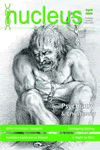Editor, I always enjoy Nucleus but the January 2003 issue was particularly good with a stimulating mix of articles.
However, I was brought up short by Bernard Palmer’s discussion of evolutionary processes (‘Science and the Christian Faith’, pp22-29). He demonstrates the amazing complexity of the universe and the wonderful way in which the laws of physics and their constants are exactly fitted to allow life to flourish on our planet, seeing this as God’s work. But when he focuses on biological complexity he fails. Here are counterpoints to some of his statements in the section on ‘evolution’ (p26):
- Certain mutations enable plants to thrive on toxic soils and rats to resist warfarin, whilst sickle heterozygosity protects from malaria.
- Inversions, translocations etc allow chromosome number to vary without ill-effect. One can chart such rearrangements when comparing human and other primate karyotypes.
- The Burgess Shales in the Canadian Rockies contain many fossils from the Precambrian era. These have been extensively studied.
Our biological development is as marvellous as that of the cosmos and, as the human genome is more and more unravelled, we can trace in it aspects of our evolutionary history. As Christians we can see God’s hand behind both the laws of physics and his control of the processes of mutation and natural selection as organisms adapt to become fitted for their environment.
Bernard Palmer rightly says that none of this physics or biology tells us why we are here or the purpose of our existence. We need to look for another dimension and this is demonstrated by the resurrection of Christ. If Jesus rose from the dead there is more to the creation than what we discover in physics and biology. Christians should focus here rather than on the mechanisms by which God created us. Sadly the issue of evolution can be divisive but there is no need for acceptance of evolutionary theory to be a compromise for Christians. God rules not only over the origin of the universe but also in his continuing care and upholding of the whole natural order.[1] Members of CMF’s sister organisation Christians in Science strive to understand how God works in the natural world (browse the website at www.cis.org.uk for further information). The relevant scriptures have been expounded in two books recently published by IVP.[2] Read them; or to dig deeper try the later chapters of Denis Alexander’s book Rebuilding the Matrix,[3] reviewed in the Spring issue of Triple Helix.
Caroline Berry
Retired Clinical Geneticist and Secretary of Christians in Science
Author’s reply
Editor, Thank you for asking for my thoughts on Caroline Berry’s response to my article. As she has correctly deduced, my aim was to demonstrate that there must be a divine mind behind the formation of the universe. I was careful not to say how this came about as I, like many scientists, am agnostic on this point. It is not possible to weigh up all the arguments here, but I would like to query her three objections:
- The vast majority of genetic mutations in animals are deleterious and do not confer any obvious survival advantage. The sickle cell mutation has nothing to do with the evolution of species. It is disadvantageous overall, even though heterozygotes do appear to have increased resistance to malaria. Examples of microevolution cannot explain macroevolution.
- As I understand it, chromosome inversions occur when a segment is removed, inverted and reintegrated into the same chromosome. Although this does not appear to be particularly harmful in humans, it can produce gametes with unbalanced chromosomes. Individuals with paracentric inversions are known to be reproductively inferior, so such changes are unlikely to confer survival advantages. Translocations are rearrangements of chromosome fragments within cells. I cannot understand how inversions or translocations could lead to beneficial increases in chromosome numbers. Where a translocation is unbalanced - there is an extra bit of chromosome or a piece missing - offspring are likely to miscarry or suffer serious handicaps. I am not convinced that there are known mechanisms by which totally new chromosomes with their own unique genetic structure can be formed.
- In the third paragraph, I noted that that the fossil evidence suggests that there was a ‘biological big bang’ around the Cambrian era. According to the Darwinians, life has had around five billion years to evolve. However, there is evidence that the time taken for the development of species was much shorter and took place during the Precambrian and Cambrian eras. I do not understand how the Cambrian fossils in the Burgess Shales, that range from algae to primates, contradict this.
In 1967 there was a rather tense meeting between some mathematicians and leading Darwinists at the Wistar Institute in Philadelphia. The mathematicians argued that there was nothing like enough time for the number of beneficial mutations to have occurred in, so arguing that Neo-Darwinism is an unacceptable scientific explanation for life.
Although the Bible teaches that God was intimately involved in the creation of the universe, I remain agnostic about how he did it. What I do find unacceptable is when scientists such as Richard Dawkins claim that science has removed the need for God. Science shows us that such arrogance is wrong and, as Caroline reminds us, we have an omnipotent God for whom the options are endless.
Bernard Palmer
Consultant Surgeon, Stevenage































